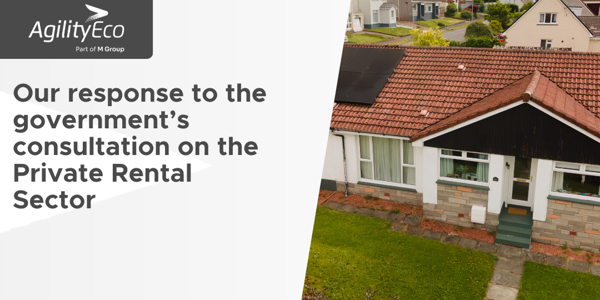AgilityEco responds to Private Rental Sector Consultation
30 April 2025

In our response to the government’s consultation on the Private Rental Sector (PRS), we strongly support the proposed reforms to energy standards within the sector. However, we urged caution regarding certain exemptions and implementation delays that could undermine progress toward net zero and fuel poverty targets.
EPC reform
In our response to the consultation, we expressed our support for using updated Energy Performance Certificate (EPC) metrics as the basis for raising Minimum Energy Efficiency Standards (MEES). We also advocated for a “fabric-first” approach, prioritising insulation and structural improvements over less effective measures.
However, landlords must be encouraged to make meaningful upgrades that reduce energy use and lower bills for tenants and warned that alternative approaches could lead to superficial improvements with limited benefits.
MEES cost cap
We welcomed the proposed increase in the MEES cost cap to £15,000 per property, considering it a realistic and necessary step for significant improvements across the sector.
However, we opposed extending the exemption period from five to ten years, citing the urgent need to reduce emissions and the rapid pace of innovation in retrofit technologies.
Implementation timeline
We also support the government’s proposed timeline requiring new tenancies to meet higher standards by 2028 and all by 2030. However, we stressed that the success of this hinges on the timely rollout of the Warm Homes Plan, EPC reform, and the availability of funding and skilled labour.
Reliability of EPCs
We also raised concerns about the reliability of existing EPCs and called for mandatory new assessments post-upgrade to ensure compliance and maintain an accurate national register. We also argued that EPC costs should not count toward the £15,000 cap, describing them as a standard business expense.
Affordability exceptions
We firmly oppose affordability exemptions, warning that such measures could exacerbate inequality by leaving tenants in lower-income areas behind. Instead, we advocate for targeted grant schemes and accessible financing to assist landlords in fulfilling their obligations.
Short term lets and smart meters
We also support expanding the MEES to include short-term rentals. This is essential to ensure fairness and to prevent further reductions in the availability of long-term rental properties.
Regarding smart meters, we advocate for a national campaign led by the government and energy suppliers rather than shouldering this responsibility solely on landlords and tenants.
Enforcement of MEES
We also highlighted in our response the need for better enforcement of MEES, as there is widespread non-compliance due to under-resourced local authorities. We recommended empowering councils to grant exemptions on a case-by-case basis. We opposed delaying obligations on letting agents and property platforms, as tenants deserve immediate access to EPC information.
Our response to the Private Rental Sector highlights the importance of balancing ambition with fairness and practicality, ensuring that both landlords and tenants benefit from a more energy-efficient rental market.


